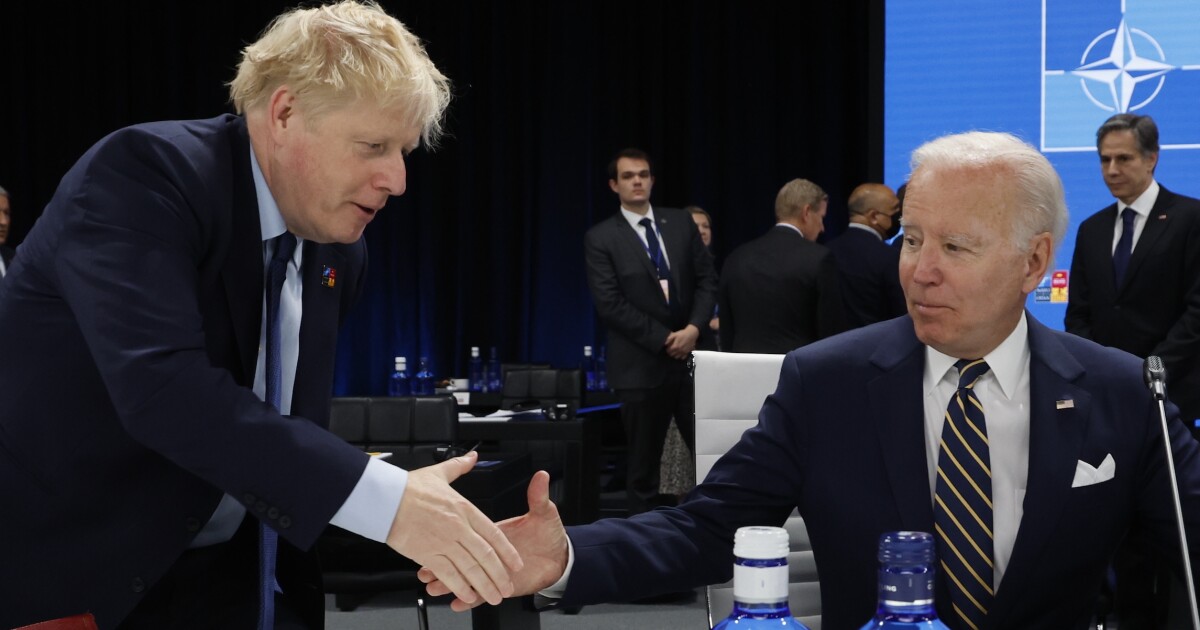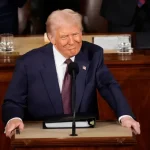

With the war in Ukraine raging and causing economic upheaval as it nears the six-month mark, President Joe Biden will soon greet a new leader of one of America’s closest allies.
British Prime Minister Boris Johnson, whom Biden once compared to former President Donald Trump, announced Thursday that he will step down from the post in the coming months, bringing an end to a scandal-ridden tenure.
THE TRAGEDY OF BORIS JOHNSON: A HERO BROUGHT DOWN BY HIS OWN ELEMENTAL FLAWS
“No one is remotely indispensable,” Johnson said in a speech outside No. 10 Downing Street on Thursday. “I regret to not be successful in arguments, and it’s painful not to see through so many ideas and projects.”
A timetable for selecting a new leader will be announced next week, and Biden will soon be working with a new ally in the “special relationship” between the United States and the United Kingdom at a perilous time.
Johnson was a strong leader when it came to sanctioning Russia and its president, Vladimir Putin, but was plagued by scandals at home that led to his downfall after three years in office. In that sense, a new face leading Britain could be a positive for Biden, argues Charles Kupchan, who served as senior director for European affairs in the Obama White House.
“Johnson’s resignation will bring to an end a sustained period of unpredictability and chaos in the British government,” said Kupchan, now a Georgetown University professor and senior fellow at the Council on Foreign Relations. “Johnson was someone who seemed to stumble from one crisis to the next, and I think that everything else being equal, Washington will be pleased to have a steadier hand at the head of the British government.”
Biden and Johnson worked well together in the way that presidents and prime ministers are expected, but there was acrimony between the two of them before both assumed office. Johnson is best known for securing Britain’s “Brexit” from the European Union, a move that largely upset Democrats and was promoted by Trump as paralleling his own 2016 election.
The connection was such that Biden once described Johnson as a “physical and emotional clone” of Trump.
“Johnson and Trump had quite a special relationship,” said Brookings Institution senior fellow Dan Hamilton. “I think Boris Johnson was hoping Trump would win [in 2020]. They both celebrated Brexit as a great thing. I think Biden thought it was one of the worst things that could have happened.”
But the two worked well together when it came to Ukraine, Hamilton added, a dynamic he expects to continue regardless of who becomes the next prime minister.
“Johnson was tough on Russia, very supportive of Ukraine, and very at the hip with Biden on those issues,” he said. “I don’t see any successor stepping back on that.”
The two did not see eye to eye on the issue of the Northern Ireland Protocol, which deals with the border between Northern Ireland and the Republic of Ireland and is also related to Brexit. Biden, who is of Irish ancestry, was also a close friend of former Sen. George Mitchell, who helped broker the 1998 Good Friday Agreement that helped stabilize the border. How this issue will progress going forward will depend on the makeup of the next British government.
Overall, the two leaders worked largely as would be expected for leaders in their positions, said Heritage Foundation Anglo-American Relations expert Ted Bromund.
“By and large there were things most U.S. administrations would have done in alliance with the U.K. government given what’s going on in the world,” he said. “I don’t think it’s liable to change very much. There is deep support for Boris Johnson’s Russia policy in the conservative majority in the House of Commons. And I don’t see much desire on the part of Labour or the Liberal Democrats that would be perceived as a pro-Russia position in favor of weakening sanctions. It’s unlikely there will be a significant change in the U.K. position there.”
Biden himself reiterated this stance the day Johnson announced his resignation, affirming that “the United Kingdom and the United States are the closest of friends and allies, and the special relationship between our people remains strong and enduring” and mentioning the two will stay united against Putin’s invasion of Ukraine.
CLICK HERE TO READ MORE FROM THE WASHINGTON EXAMINER
Experts interviewed for this story all agreed that U.S. and U.K. foreign policy is unlikely to change much with a new occupant at No. 10 Downing Street, with some arguing that if there is a change, it’s likely to be for the better.
“We’re living through strange times,” Kupchan said. “The West is threatened externally by Russia and China and threatened internally by illiberal populism. Given that the U.K. is one of America’s closest partners, political purpose and political stability in the U.K. is an important asset for the U.S. Given how tumultuous Johnson’s tenure has been, I think we’re looking at a change in leadership that, on balance, will be good for the U.S. and for the U.S.-U.K. bond.”







